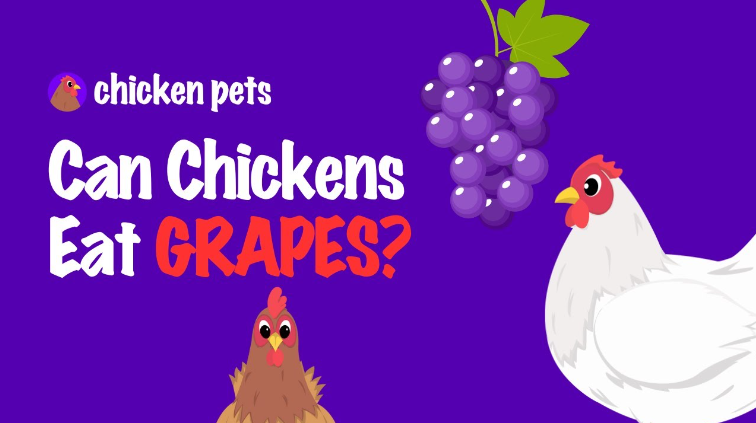Can Chickens Eat Grapes? Surprising Snack Facts!

Yes, chickens can eat grapes safely in moderation. Grapes provide chickens with a tasty, nutritious snack.
Chickens enjoy a diversified diet, and grapes can be an enjoyable part. Many backyard chicken keepers observe that their poultry flock relishes the occasional grape. Grapes, rich in water, vitamins, and antioxidants, offer health benefits when fed as part of a balanced diet.
It’s essential to cut the grapes into appropriate sizes to prevent choking, and organic grapes are preferable to avoid pesticide exposure. While grapes are generally safe, they should be given to chickens in reasonable amounts alongside their regular feed to maintain optimal health and avoid potential digestive issues. Feeding grapes as a treat ensures that your chickens benefit from both the nutrients and the variety they bring to the diet.
Contents
- 1 Feathered Friends And Fruitful Treats
- 2 Sizing Up Snacks: Grapes For Chickens
- 3 Hidden Hazards Of Grapes
- 4 Preparatory Pecks: Serving Grapes Right
- 5 Diversity In Diet: Balancing Chicken Feeding
- 6 Watching For Weird Reactions
- 7 Chickens And Grapes: Owners’ Experiences
- 8 Flocking Together: Community Q&A About Chickens And Grapes
- 9 Conclusion
Feathered Friends And Fruitful Treats
Chickens love a varied diet, and as backyard chicken enthusiasts, we’re always looking for safe, delicious treats for our clucking companions. One common question that arises is about feeding grapes to our feathered friends. Let’s dive into why these juicy fruits might be the perfect snack for your chickens.
Why Grapes Appeal To Chickens
Chickens have a natural inclination for pecking and foraging, and grapes are an ideal size for this instinctive behaviour. The round shape of grapes makes it fun for chickens to roll around and chase, almost like they are playing a game. Grapes are juicy, which provides a refreshing treat, especially on a hot day.
Nutritional Value Of Grapes For Chickens
Grapes are packed with nutrients beneficial for chickens. They are high in water content, which helps in hydration. Additionally, grapes contain vitamins like vitamin C and K, which support the immune system and blood clotting.
| Nutrient | Benefit |
| Vitamin C | Boosts immunity |
| Vitamin K | Promotes healthy clotting |
| Antioxidants | Fights free radicals |
| Manganese | Aids in bone formation |
| Water Content | Provides hydration |
- Grapes should be fed in moderation due to their sugar content.
- Ensure grapes are cut into halves for younger chickens to avoid choking hazards.
- Avoid giving chickens grapes with seeds, as these may present a risk.
Sizing Up Snacks: Grapes For Chickens
Like us, chickens enjoy a variety of foods, including fruit. Grapes are a tasty snack for your feathered friends. Understanding the correct serving size and frequency is critical to keeping them healthy. Let’s explore how grapes fit into a chicken’s diet.
The Right Portion Size
Chickens can have grapes as a treat, but getting the portion right is crucial. Here’s a simple guide:
- Chop grapes into halves or quarters to prevent choking.
- Limit to 1-2 grapes per chicken to maintain a balanced diet.
- Alternate with other treats to provide variety.
How Often Can Chickens Have Grapes?
While chickens relish grapes, moderation is the key. Consider the following guidelines:
- Offer grapes 2-3 times a week, not daily.
- Grapes are a treat, not a meal replacement.
- Watch for any adverse reactions, like changes in digestion.
Hidden Hazards Of Grapes
Love giving your feathered friends a treat? Grapes can be a tasty snack for chickens, but there are hidden hazards to consider before sharing these juicy fruits with your flock. Understanding these risks helps keep your chickens safe and healthy.
The Toxin Debate Around Grapes
One concern is the unknown toxin that can cause severe problems in some pets, especially dogs. While chickens are not dogs, the lack of concrete evidence means risk could exist. To err on caution, consider offering grapes in moderation and watching your birds for any adverse reactions.
Potential Choking Risks
Grapes are round and can quickly become lodged in a chicken’s throat. This is especially true for smaller breeds or young chicks. Cutting grapes in half or crushing them can minimize the danger, ensuring they can enjoy this treat without the scare.
- Chop grapes to prevent choking.
- Monitor chickens while eating grapes.
- Offer grapes as an occasional snack only.
- Watch for unusual behaviour post-grape consumption.
Preparatory Pecks: Serving Grapes Right
Owners often wonder about sharing fruits with their feathered friends, particularly grapes. When prepared correctly, This juicy treat can be a healthy snack for chickens. Proper preparation ensures that chickens enjoy their treats safely. Let’s dive into how to serve grapes to your poultry pals.
To Cut Or Not To Cut
Grapes come in all sizes. Smaller breeds may find large grapes challenging to eat whole. Cutting grapes into halves or quarters can prevent potential choking. Young chicks significantly benefit from smaller pieces. Here’s a simple guide:
| Chicken Type | Grape Size | Action |
| Adults | Small | Whole |
| Adults | Large | Cut in halves |
| Chicks | Small | Cut in quarters |
| Chicks | Large | Cut in quarters |
Innovative Ways To Present Grapes
Introducing grapes in fun ways can stimulate chickens and enrich their environment. Try these creative options:
- Dangle grapes from a string to create a pecking game
- Freeze grape halves for a cool treat on hot days
- Hide grapes in their feed to encourage foraging
Mixing cut grapes with other safe fruits and vegetables in a colourful salad garners interest and varies nutrition. Just remember, moderation is key. Grapes should be an occasional snack, not a meal replacement.
Diversity In Diet: Balancing Chicken Feeding
Chickens love snacks; just like us, they thrive on a varied diet. A mix of foods keeps chickens healthy and happy. Offering different treats, such as grapes, can provide essential nutrients. It’s vital to balance their feeding routine to ensure they get everything they need for optimal health and vitality.
The Importance Of A Varied Diet
A varied diet for chickens isn’t just about enjoyment. It impacts their health. Chickens require a blend of proteins, carbohydrates, fats, vitamins, and minerals. Tossing a few grapes into their feed introduces hydration and a hint of natural sugar, making it a nutritious treat. Grapes should be given in moderation, complementing their main diet of quality chicken feed.
- Builds immunity: A range of foods boosts resistance against diseases.
- Improves egg production: Diverse nutrients contribute to quality eggshell formation.
- Foster’s natural behaviours: Foraging for different foods promotes healthy activity.
Other Safe Snack Alternatives
Aside from grapes, many snacks are chicken-friendly and can add to dietary diversity. Here’s a brief list of treats chickens can safely enjoy:
| Snack Type | Benefits |
| Leafy greens | Rich in vitamins |
| Mealworms | High in protein |
| Cooked beans | Good protein source |
| Small berries | Antioxidants and vitamins |
| Cucumbers | Hydration and vitamins |
Each snack should be fed in small quantities to maintain a balanced diet. Always research before introducing a new snack to your chickens. Ensuring treats are safe for them is vital to their health.
Watching For Weird Reactions
Chickens often enjoy a variety of treats, and grapes are no exception. While these juicy fruits are generally safe, each chicken is unique. Some may experience weird reactions after munching on grapes. It’s crucial to observe your feathery friends post-snack-time. Look for any odd behaviours or signs of discomfort. This proactive approach ensures your chickens stay happy and healthy.
Signs Of Allergies Or Intolerance
- Puffiness around the eyes or face
- Difficulty breathing, wheezing, or coughing
- Lethargy or lack of movement
- Change in droppings, such as unusual colour or diarrhoea
These signs indicate your chicken may not tolerate grapes well. Watch closely after they peck on this tasty fruit. Observe any immediate or delayed reactions to ensure their safety.
When To Consult A Vet
A timely response is vital if you notice abnormal symptoms. Here’s a quick checklist:
| Reaction | Action |
| Rapid Symptoms | Contact your vet immediately. Quick action is often crucial. |
| Mild Symptoms | Monitor your chicken closely. If conditions worsen, seek vet care. |
Don’t hesitate to reach out to a professional. They provide the best guidance for your chicken’s health. Remember, your chickens rely on you for their well-being. Stay observant, knowledgeable, and ready to act when needed.
Chickens And Grapes: Owners’ Experiences
Owners of backyard chickens often wonder about the safety and benefits of feeding their feathered friends various snacks. Grapes, with their juicy sweetness, seem like a tempting treat. Many chicken owners have shared positive experiences with these tiny fruits, noting ample enthusiasm from their clucking companions. Let’s delve into real-life anecdotes and explore how to conduct snack experiments with your brood.
Anecdotes From The Coop
- Sarah’s Speckled Sussex: “My hens go wild over grapes! One peck, and it’s a chase to see who gets the treat.”
- Jason’s Jersey Giants: “I only give a few grapes as an occasional treat, and they seem to love it!”
- Lisa’s Layers: “My girls enjoy grapes, but always in moderation due to the sugar content.”
These anecdotes suggest that chickens can enjoy grapes, but it is crucial to observe their reaction and offer fruits in small quantities.
Conducting Your Chicken Snack Experiments
Are you curious to see how your chickens take to grapes? Here’s a simple guide to get started:
- Select fresh grapes: Ensure they are washed and cut in halves to prevent choking.
- Start small: Introduce a few pieces to avoid overfeeding.
- Watch closely: Look out for any unusual behaviour or digestive upset.
- Limit intake: Treat grapes as a special snack, not a staple.
Take plenty of notes during this experiment. This will help you understand your chickens’ preferences and any effects on their health.
Flocking Together: Community Q&A About Chickens And Grapes
Discover the do’s and don’ts of feeding your feathered friends! This section explores the safe indulgence of grapes in a chicken’s diet. Join the flock as we dive into the most common inquiries, coupled with insights from seasoned poultry keepers.
Common Questions Answered
Chickens can enjoy grapes, but moderation is key. We gathered the most frequent questions on this topic and provided clear, concise answers.
- Are grapes safe for chickens? Yes, in small amounts.
- How many grapes can a chicken eat? One or two, depending on the size.
- Should grapes be cut or whole? Halved to ease pecking and prevent choking.
Expert Advice From Poultry Enthusiasts
Here, experienced enthusiasts weigh in. Their knowledge ensures your chickens relish grapes safely.
- Offer grapes as an occasional treat. Balance is essential in a chicken’s diet.
- Monitor your chickens during snack time. This helps in case of any adverse reactions.
- Wash all fruits thoroughly before presenting them to your flock.
Conclusion
Feeding grapes to chickens can be a delightful treat when done in moderation. These juicy fruits offer vitamins and hydration but remove seeds and ration portions. Always prioritize their core diet and enjoy watching your feathered friends peck at this sweet snack responsibly!



